- Home
- Fergus Hume
The Millionaire Mystery Page 10
The Millionaire Mystery Read online
Page 10
‘Are you not going to make any more search for the body, Alan?’
‘My dearest, I have not the slightest idea where to begin. The case has baffled the police, and it baffles me. I have made inquiries all round the country, and I can find no one who saw Brown with your father’s dead body, or, indeed, anything else which might have aroused suspicion. There is only one hope that we may get it back.’
‘The reward?’
‘No; although Blair, and, I believe, Cicero, intend to work for that. The hope lies in the chance that Brown, whoever he is, may have taken away the body for blackmail. In that case we may get a letter demanding money—probably a large sum. We must pay it, and have your father’s remains brought back.’
‘And the murder, Alan?’
‘Ah! that is a difficult part. When Brown stole the body he did not intend to commit murder; that came about in some unforeseen way. The danger that he may be arrested for the murder may keep Brown from applying for blackmail, always supposing, Sophy, that such is his object.’
‘In that case we may never recover poor father.’
‘I am afraid not. However, we must live in hope.’
This conversation ended in the usual unsatisfactory way. On the face of it there was nothing to be done, for Alan could obtain no clue. Brown, if Brown were indeed the guilty person, had managed so cleverly that he had completely cut his trail. Even the offer of the reward brought forth no fresh information. The mystery was more a mystery than ever.
In his capacity of trustee, Alan had looked through the papers of the dead man. He found no documents or letters whatever relating to his life in Jamaica, yet there were plenty dealing with his doings in South Africa. Twenty years before he had left Kingston with the child Sophy. He brought her to England, and placed her in the Hampstead convent. Then he sailed for the Cape, and had made his fortune there. Fifteen years after he returned, to buy the Moat House, and settled. Sophy came to live with him, and he had passed a quiet, peaceful time until his sudden death. So far all was clear; but the Jamaica life still remained a mystery. When he died he was over sixty. What had he done with himself during the forty years he had lived in the West Indies? Joe could have told; but Joe, as mysterious as his master, had disappeared, and even if he had remained, Alan could have got nothing out of him. The old sailor, as had been proved both by Thorold and the inspector, was as dumb as an oyster.
‘Did Marlow ever mention Jamaica?’ Alan asked Mr Phelps, when next they met.
‘Once or twice, in a casual sort of way. He said he had sailed a good deal amongst the islands.’
‘And Joe was a sailor. I wonder if Marlow went in for trading there?’
‘It’s not impossible,’ said the Rector; ‘but that fact, even if we knew it to be true, could throw no light on the disappearance of his body.’
‘I don’t know. I have a good mind to go to Jamaica—to Kingston—to make inquiries. The West Indian Island area is not so very large. If Marlow had been a trader there twenty years ago, he would still be remembered amongst them. I might come across someone who knew of his past life.’
‘You might,’ assented Phelps, with an amount of sarcasm surprising in so mild a man, ‘if Marlow were his real name.’
The two were sitting over their wine in the twilight amid the glimmer of shaded candles. This last remark of the Rector’s so surprised Alan, that he turned suddenly, and knocked his glass off the table. After he had apologized for the accident, and after the debris had been collected by the scandalized butler, the Squire asked Mr Phelps what he meant.
‘It is hard to say what I mean.’ The Rector sipped his port meditatively. ‘Marlow was always a mystery to me. Undeniably a millionaire and a gentleman, Alan, and while here a man of clean life. And I have met people in London’—the worthy parson dabbled a little in shares—‘who knew him in South Africa. He was highly respected there, and he made his millions honestly, so far as millions can be made honestly in these gambling days. But I always felt that there was some mystery about the man. It was Warrender who gave me the clue.’
‘Ah! Warrender came with Marlow to Heathton.’
‘Yes, but there was no mystery about that. Warrender told me that he had met Marlow at Kingston, Jamaica. Afterwards the doctor settled in New Orleans. There he met his wife, who was on the stage. He did not do very well, so Mrs Warrender urged him to return to England. He did so, and met Marlow by chance in London, where they renewed their acquaintance. Sorry to see that Warrender was so unfortunate, Marlow brought him down here, where he did very well.’
‘I don’t think he did well enough to have supplied Mrs Warrender with her diamonds, sir.’
‘Alan, don’t speak evil of the dead. She did not get the diamonds from Marlow, but legitimately, my dear boy, from her husband.’
‘And where did he get them? His practice must have brought him in little enough.’
‘No, I won’t say that. The fact, I think, is that there was some understanding between the two men, and that Marlow gave Warrender money.’
‘He must have given him a good deal, then. Those jewels represent a lot. Seems like a kind of blackmail, sir.’
‘On that point, Alan, I would prefer not to give an opinion.’
‘And Warrender helped to steal the body of his patron,’ mused Alan. ‘Strange. But about this idea of a false name.’
‘Well, it was at dinner one evening. The ladies had retired, and I was alone with Marlow and Warrender, talking over our wine, just as you and I might be now, Alan. The doctor had taken a little too much, and on one occasion he addressed the other man as Beauchamp. Marlow flashed one fierce glance at him, which sobered him at once. I made no remark on the incident at the time, but it stuck in my memory.’
‘Then you think that Mr Marlow was called Beauchamp in Jamaica?’
‘Warrender’s slip gave me that impression,’ said the Rector cautiously.
‘How very strange!’ murmured Alan, toying with his glass. ‘Do you know the will? Of course, I am trustee.’
‘Sophy’s trustee—why, yes. All the money goes to her, doesn’t it?’
‘Most of it. There are legacies to myself, Joe Brill, and Miss Parsh. Sophy gets the rest, on conditions.’
‘What conditions?’
‘One is that she marries me, the other that she pays two thousand a year to a man called Herbert Beauchamp.’
It was the Rector’s turn to be startled.
‘Bless me, the same name!’
‘It would appear so. Perhaps this Herbert Beauchamp is a relative of the so-called Marlow. The money is to be paid into the Occidental Bank of London for transmission to him.’
‘Where is he?’
‘I don’t know. But now that you have told me so much, I shall take the first instalment myself to the Occidental Bank and make inquiries about the man. The manager may be able in some measure to account for all this.’
‘I hope so, I hope so,’ cried the bewildered Rector, ‘for the mysteries seem to me to deepen.’
‘Meanwhile,’ went on Alan calmly, ‘I shall see Mrs Warrender. She may know something that will be useful to us.’
‘I don’t think so,’ the Rector said doubtfully. ‘Bless me, why should she? It was long afterwards that she met the doctor in New Orleans.’
‘Well, he might have told her about Marlow. At all events, I’ll see her. You know,’ added Alan, curling his lip, ‘Mrs Warrender is fond of money, and amenable to bribery.’
Thorold was usually correct in his forecasts of what would happen, but this time he was quite wrong. The widow received him kindly, and told him absolutely nothing. Acting on the advice given her by Cicero, she had been searching through the papers of her late husband. She had not found what she sought, but she had found quite enough to show that there was a mystery in Mr Marlow’s past life—a mystery which was sufficiently important to be worth money. It was the intention of this astute woman to play her own game, a game which had for stake a goodly portion of Soph
y’s millions, and she had no desire for a partner. To Cicero and to his wish to join her she soon gave the go-by. And when Alan came upon the scene, she gave him to understand that she knew nothing. Her intention was to prepare her bombshell alone, and when it was ready, to explode it in Sophy’s presence. That her knowledge would be profitable to her from a financial point of view she felt pretty secure, for the same blood ran in the veins of Clara Maria Warrender and of Cicero Gramp.
‘I wish I could help you, Mr Thorold,’ she said; ‘but I knew nothing of Mr Marlow. My husband never spoke to me about his life in Jamaica.’
‘Did he leave any papers?’
‘Lots of rubbish, but nothing that could enlighten us as to Mr Marlow’s past.’
‘Can I see them?’
‘Oh, I am so sorry, but I burnt them.’
He did not believe her, and went away with the conviction that she was playing a deep game. Meanwhile a new personage had come upon the scene—a man who told an astonishing story, and who made a no less astonishing claim—a slight, dark, bright-eyed man, accurately dressed, but foreign looking. He presented his card at the Moat House, with a request to see Miss Marlow.
‘Captain Lestrange!’ exclaimed Sophy. ‘Who is he, Thomas?’
‘Looks like a foreigner, miss. Shall I show him in?’
‘Yes,’ she said; and the visitor was announced almost immediately.
He started theatrically when he saw the girl. Sophy, annoyed by his manner, drew back.
‘Captain Lestrange?’ she queried coldly.
‘Captain Lestrange,’ was the reply, ‘and your father.’
CHAPTER XII
A STRANGE STORY
SOPHY neither screamed nor fainted at this extraordinary announcement; indeed, it appeared to her so very ridiculous that she felt more inclined to laugh. However, she controlled her feelings, and spoke very quietly—so quietly that the visitor was somewhat disconcerted.
‘Why do you make this strange assertion?’ she asked, looking again at his card.
‘Because it is true.’
‘What proof can you give me of its truth?’
‘Three proofs, Sophy, if I may call—’
‘You may not!’ interrupted the girl, flushing. ‘I am Miss Marlow.’
‘For the present,’ assented the man, with an ironical smile. ‘Soon you will be Miss Lestrange. Three proofs, then, I have. Firstly, I can tell you the story of how I lost you; secondly, there is the resemblance between us; and, thirdly, I have the certificate of your birth. Oh, it is easily proved, I can assure you.’
She shivered. He spoke very positively. What if his claim could be substantiated? She looked at him; she glanced into a near mirror, and she saw with dismay that there was a strong resemblance. Like herself, Lestrange, as he called himself, was slight in build, small in stature. He also had dark hair and brilliant eyes; the contour of his face, the chiselling of his features, resembled her own. Finally, he had that Spanish look which she knew she herself possessed. So far as outward appearances went, she might well have been the daughter of this rakish-looking stranger. He smiled. From her furtive glance into the mirror he guessed her thoughts.
‘You see the glass proclaims the truth,’ said he. ‘Think of your supposed father, Richard Marlow—tall, fair, blue-eyed, Saxon in looks! Like myself, you have the Spanish look and possess all the grace and colour of Andalusia. I always thought you would grow up beautiful. Your dear mother was the loveliest woman in Jamaica.’
She did not answer, but the colour ebbed from her cheeks, the courage from her heart. It was true enough that she in no way resembled Mr Marlow. This man might be her father, after all. Yet he repelled her; the glance of his glittering eyes gave her a feeling of repulsion. He was a bad man, of that she felt certain. But her father? She fought against her doubts, and with a courage born of despair she prepared to defend herself until help arrived. Her thoughts flew to Alan; he was the champion she desired.
‘I expect my guardian, Mr Thorold, in a quarter of an hour,’ she said in a hard voice. ‘You will be good enough to relate your story to him. I prefer to hear it when he is present.’
‘You don’t believe me?’
‘No, I do not. Mr Marlow treated me as his daughter, and I feel myself to be his daughter. Do you expect me to believe you, to rush into your arms without proof?’
‘I have shown you one proof.’
‘A chance resemblance counts for nothing. What about the certificate?’
He produced a pocketbook, and took out a piece of paper.
‘This is a copy of the entry in the register of the Church of St Thomas at Kingston. You will find it all correct, Marie.’
‘Marie! What do you mean?’
‘That paper will inform you,’ said Lestrange coolly.
Sophy read the certificate. Truly, it seemed regular enough. It stated that on the 24th of June, 18—, was born at Kingston, in the island of Jamaica, Marie Annette Celestine Lestrange. The names of the parents were Achille Lestrange and Zelia, his wife. Sophy could not suppress a start. The 24th of June was her birthday; the date of the year was also correct. She was twenty-one years of age now. She turned to him.
‘You are Achille Lestrange?’
‘Your father—yes.’
‘I don’t admit that, monsieur.’
‘Why do you call me “monsieur”?’
‘You are French, are you not?’
‘French by descent, if you will, but I am a British subject. Also, I am a Roman Catholic. You are of the same faith?’
‘Yes, I am of the true Faith.’
‘I am glad of that,’ said Lestrange indolently; he was as indolent as graceful, and reminded Sophy of a full-fed tiger. ‘I am pleased to hear that Marlow allowed you to retain your faith since he took from you your father and your name.’
‘Do you know that my father is dead?’
‘Pardon me, he is alive, and sitting before you.’
Sophy ignored his remark.
‘Do you know that Mr Marlow is dead?’ she asked again.
‘Ah! now you speak as you should. Yes, I heard something about his death. The fact is, I have only just landed from a Royal Mail steamer at Southampton—two days ago, in fact—so I know very little. But I have heard of the disappearance of his body. It is town talk in London. One cannot open a newspaper without coming across theories of how it happened.’
‘And the murder of Dr Warrender? Do you know of that also?’
‘Of course. The two things go together, as I understand. Marlow’s body is lost; Warrender was stabbed. How unfortunate that two people I knew should be out of the way when I come to claim you!’
‘Did you know Dr Warrender?’ asked Sophy quickly.
‘As I know myself,’ was the answer. ‘Twenty years ago, when you were a child, a mere infant, he practised in the town of Falmouth, Jamaica. He left after certain events which happened there, and, I believe, practised again in New Orleans. He married there, too, it was said.’
‘Yes; his wife lives at Heathton.’
‘Ah! I shall be glad to see her. Has the man who murdered her husband been discovered?’
‘No; he cannot be found.’
‘Nor ever will be, I suspect,’ said Captain Lestrange coolly. ‘From what I read, the whole criminal business was conducted in the most skilful manner. I wonder why they stole poor Dick’s body.’
‘Poor Dick!’ retorted the girl indignantly. ‘Are you speaking of my father?’
‘Of the man who passed as your father—yes, Marie, I am.’
‘Pray don’t call me Marie! I am Sophia Marlow.’
‘As you please. Temper again! Oh, how you remind me of Zelia!’
She was confounded at the cool assurance of the man. Nothing seemed to ruffle his temper or banish his eternal smile. He was more hateful to her than ever. Never would she acknowledge herself his daughter, even should he prove his claim! She was of age, and her own mistress. The will of Richard Marlow left the money, not to
‘my daughter’ but to ‘Sophia Marlow’, so there was no possibility of the money being taken from her. Then she thought of Alan. He would stand between her and this man. And even as this thought came into her mind, the door opened, and Thorold came forward eagerly to meet her; but, on perceiving the stranger, he stopped short. Lestrange rose and bowed in a foreign fashion.
‘Oh, Alan!’ cried Sophy, ‘I am so glad you have come! I was waiting for you.’
‘And I also,’ remarked Lestrange.
‘Who is this gentleman, Sophy?’ demanded Alan.
‘He calls himself Captain Lestrange. Here is his card.’
‘Captain in the army of the Peruvian Republic,’ said the man, ‘and this young lady’s father!’
‘Confound you!—what—what—!’
‘Oh yes, Alan. He says he is my father—that my true father stole me from him. Here is the certificate of my birth, he says.’
‘And here’—Lestrange pointed to Sophy—‘here is my second self. Can you deny the resemblance? By the way, who are you?’
The inquiry was made with graceful insolence, and was meant to provoke the young man into losing his temper. But in this it failed.
‘I am Alan Thorold,’ he said quietly, ‘the Squire of Heathton, and I am engaged to marry Miss Marlow—’
‘Pardon—Mademoiselle Lestrange,’ interpolated the Captain, and resumed his seat. ‘I claim this young lady as my daughter.’
‘Good,’ said Thorold coldly. ‘Your proofs?’
‘The resemblance between us, the certificate of her birth, and the story of how I lost my dear Marie twenty years ago.’
‘The resemblance I admit, but that goes for nothing. As to the certificate, it is that of Marie Lestrange, and not of Sophy Marlow.’
‘Is not the birthday of Miss Marlow, as you will call her, on the 24th of June—’
‘Yes,’ said Sophy, before Alan could stop her. ‘The day and the year are both correct. I am twenty-one, and I was born on the 24th of June, 18—.’
‘Very good; and at Kingston?’
‘At Kingston,’ admitted the girl; ‘but, for all that, I am not your daughter.’
‘I agree with Miss Marlow,’ said Mr Thorold. ‘Let us hear your story. That it will convince me I do not promise.’

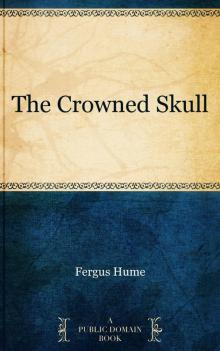 The Crowned Skull
The Crowned Skull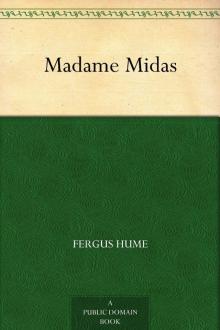 Madame Midas
Madame Midas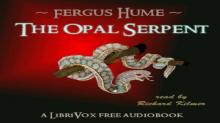 The Opal Serpent
The Opal Serpent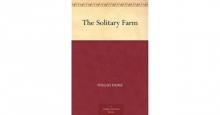 The Solitary Farm
The Solitary Farm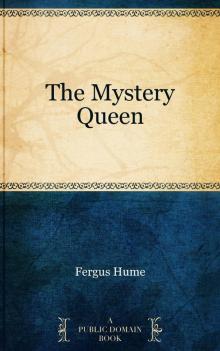 The Mystery Queen
The Mystery Queen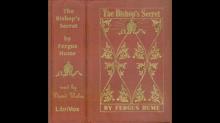 The Bishop's Secret
The Bishop's Secret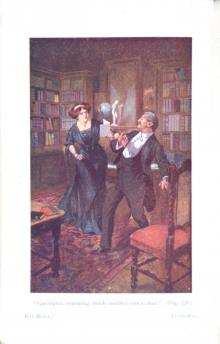 Red Money
Red Money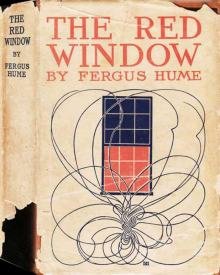 The Red Window
The Red Window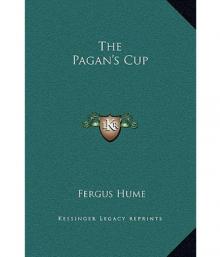 The Pagan's Cup
The Pagan's Cup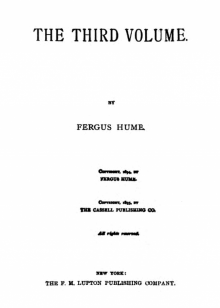 The Third Volume
The Third Volume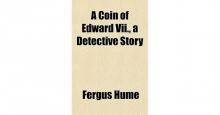 A Coin of Edward VII: A Detective Story
A Coin of Edward VII: A Detective Story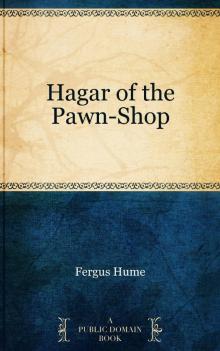 Hagar of the Pawn-Shop
Hagar of the Pawn-Shop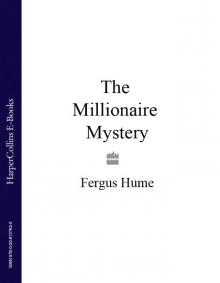 The Millionaire Mystery
The Millionaire Mystery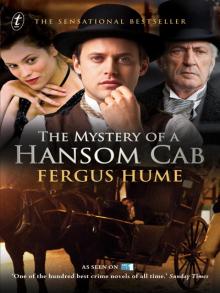 The Mystery of a Hansom Cab
The Mystery of a Hansom Cab